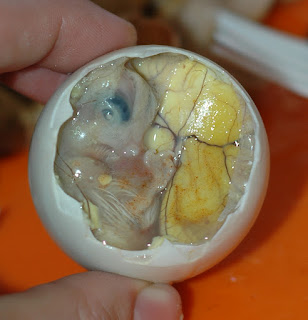Balut Egg
Balut is a fertilized bird egg (usually a duck) that is incubated for 14 to 21 days, boiled or steamed, and the contents eaten direct from the shell.
Mallard duck eggs are the preferred eggs for making balut.
In balut that has been incubated for longer periods, the embryo is well developed and the features of a baby duck are recognizable.
Salut is popular in southeast Asian countries and is most often served with beer.
Traditionally, the fertilized eggs are incubated in the sun or buried in sand, and stored in baskets to retain warmth. In order for the embryo to develop normally, it must be exposed to heat for the correct period of time, while ensuring that the temperature is not too hot to harm the eggs or too cold to prevent growth. The embryo is very sensitive to high temperatures, and is easily killed upon cooking in the sun. After nine days, the eggs are held to a light to reveal the embryo inside. The production of balut depends on egg maturation cycles, where the egg begins developing and changes in texture. Throughout these various maturation periods, different temperatures are required to accentuate the specific egg and embryo characteristics. Within the first few stages of maturation, balut is known as "balut sa puti" ("wrapped in white") when it is white; the embryo inside is insufficiently developed to show a beak, feathers or claws, and the bones are undeveloped. These are made from very specific egg types, less than five days old and with no visible surface cracks.
The duration of egg incubation is a matter of local preference. In the Philippines, balut is generally incubated for 14 to 18 days before being boiled for consumption. At about 14 to 16 days of incubation, the embryo floats on top of the egg white and yolk, and the balut is called "mamatong". The ideal balut is said to be 17 days old.
There are other versions of balut. In the Cambodian version, "pong tia koun", the egg is incubated for 18 to 20 days. In the Vietnamese version, "hot vit lon", the egg is incubated for 19 to 21 days, when the embryo is old enough to be recognizable as a baby duck and has bones that will be firm but tender when cooked.
In the Philippines, balut eaters prefer salt, or a chili, garlic, and vinegar (white or coconut sap) mixture to season their eggs. The eggs are savored for their balance of textures and flavors; the broth surrounding the embryo is sipped from the egg before the shell is peeled, and the yolk and young chick inside can be eaten. All of the contents of the egg may be consumed, although the white albumen may remain uneaten depending on the age of the fertilized egg. This white albumen may have an unappetizing cartilaginous taste and is tough and rubbery in texture. In the Philippines, balut have recently entered haute cuisine by being served as appetizers in restaurants, cooked adobo style, fried in omelettes or even used as filling in baked pastries. In Vietnam, balut are eaten with a pinch of salt, lemon juice, plus ground pepper or ginger and Vietnamese mint leaves called rau răm. In Cambodia, balut are eaten while still warm in the shell and are served with nothing more than a little garnish, which is usually a mixture of lime juice and ground pepper.
Chinese traders and migrants are said to have brought the idea of eating fertilized duck eggs to the Philippines. However, the knowledge and craft of balut-making has been localized by the balut-makers (mangbabalot). Today, balut production has not been mechanized in favor of the traditional production by hand. Although balut are produced throughout the Philippines, balut-makers in Pateros are renowned for their careful selection and incubation of the eggs
Vendors sell cooked balut from buckets of sand (used to retain warmth) accompanied by small packets of salt. Uncooked balut are rarely sold in Southeast Asia. In the United States, Asian markets occasionally carry uncooked balut eggs. Alternatively, they can be ordered by mail. The cooking process is identical to that of hard-boiled chicken eggs, and baluts are eaten while still warm.
Duck eggs that are not properly developed after nine to twelve days are sold as penoy, which look, smell and taste similar to a regular hard-boiled egg. In Filipino cuisine, these are occasionally beaten and fried, similar to scrambled eggs, and served with a vinegar dip.
Balut Egg - Boiled And Peeled






No comments:
Post a Comment